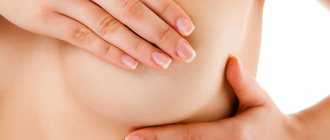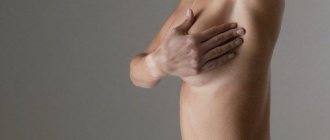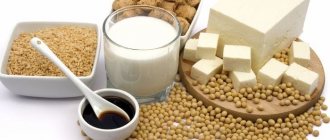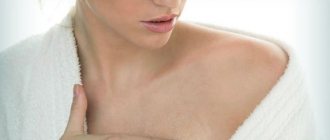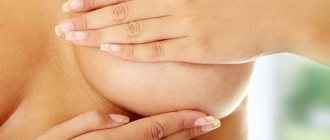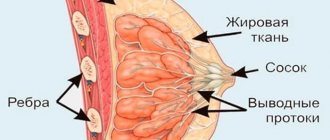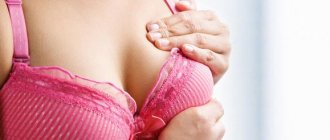string(10) "error stat"
There are many reasons why women's breasts itch. In addition, pain may be an additional symptom. Before wondering how to get rid of itching in the chest, it is worth finding out the cause of this phenomenon. The most common causes of discomfort in the mammary glands are described below.
If the left and right breasts are very itchy: features
More often, the desire to scratch the skin of the mammary glands bothers pregnant women at any stage of gestation, throughout the entire period of lactation, and occurs in young girls during puberty. With an unpleasant feeling, they came up with various ancient signs related to personal life.
If the desire to itch does not go away, but only worsens over time, this is a reason to consult a doctor. The specifics of the condition are dealt with by gynecologists, mammologists, and dermatovenerologists. Accurate diagnosis allows you to quickly determine what is causing your breast itching and prescribe timely treatment.
Note! If the left and right breasts are very itchy at the same time, then most likely there is an allergy or hormonal disorder. The unpleasant sensations of scabies are often caused by physiological factors, and not by serious pathological changes in a particular organ.
Why does the left and right breast itch: reasons
The occurrence of scabies can be associated with various factors that served as a trigger for the development of unpleasant sensations. Common causes are called domestic and physiological, and rare causes are called pathological. Common reasons include: But why does the left and right breast itch according to signs - this is just a way of entertainment for rural unmarried girls.
- Tendency to allergies. Allergic itching of the mammary glands can occur due to washing powder, quality underwear, body care products, jewelry, perfumes, and some products.
- Insect bites. Bites can cause a strong sensation of pain and burning, even if the damage was localized to the décolleté area. A bumblebee or bee sting can cause swelling of the mammary gland and severe pain.
- Clothes or underwear. Tight bras, rough lace, and synthetic materials can cause unpleasant itching on the skin of the mammary glands.
- Infectious lesion. The development of mastitis during lactation, chicken pox, dermatitis, urticaria, Siberian lichen, psoriatic rashes, acne in the causative area - all these are common causes of burning, pain, and the desire to itch.
- Dermatological diseases. Diaper rash in the summer or when wearing clothes without a bra occurs as a result of a woman's sweating. Diaper rash can cause sores, scabs, and weeping blisters to form. Treatment of such conditions often involves medical intervention.
Unpleasant conditions can be caused by multiple factors.
Determining the diagnosis
Infectious diseases, diseases of the heart, lungs, and spine can be felt in the chest area. To determine the diagnosis, you need to find out the nature of the pain.
When there is pain under the right breast, there is a possibility that hepatitis, pancreatitis, and renal colic are making themselves felt in this way. In the upper part of the chest (on the right side) lung diseases are felt. Most often, chest pain on the left side can be associated with heart disease, intercostal neuralgia, and vegetative-vascular dystonia.
If pain in the mammary glands is accompanied by enlarged lymph nodes in the armpits and lumps, and there is also discharge from the nipples, you should immediately make an appointment with a doctor. A complete diagnosis, mammography, ultrasound of the mammary glands, biopsy and tests for tumor markers will be required.
Serious reasons for examination are mastopathy, in which lumps and cysts appear. The examination is necessary in order to avoid the progression of the disease and prevent cancer. With mastopathy, pain can be felt from time to time or be prolonged during menstruation. You should immediately go to the doctor, as pain may indicate complications.
Breast cancer is the most common cancer among women. This insidious disease is dangerous because it does not have any specific symptoms. If you have the slightest doubt about the health of your mammary glands, you should consult a doctor. The sooner the disease is detected and treatment is started, the greater the chances of defeating the disease and avoiding surgery and chemotherapy.
Signs of breast cancer:
- pain in some areas of the mammary gland;
- redness and peeling of the skin;
- nipple retraction;
- discharge with blood.
It is important to find out the cause of any chest pain, and for this you need to see a doctor and undergo an examination. You should not decide on your own which treatment methods to use.
Prevention of breast cancer includes:
- Healthy lifestyle.
- Physical activity without overexertion.
- Complete balanced nutrition. Too fatty, canned and salty foods do not add health, but on the contrary, they are harmful. There should be more vegetables and fruits on your table, especially cereals and citrus fruits. Give preference to fish (mackerel, for example), the consumption of which prevents the development of cancer.
- Eliminate tight bras and synthetic underwear from your wardrobe, and give preference to natural fabrics. Remember: you should not wear bras for more than 12 hours, and you should wear loose clothing to bed.
- Physical education and sports will help you stay healthy, but within reasonable limits, without fanaticism.
- Take a sedative if prescribed by your doctor.
- Get rid of bad habits (if you have them). Smoking and alcohol are harmful to beauty and health.
- Avoid sunbathing during hours when the sun is active. It will be more beneficial if you bask in the sun in the morning (before 12 o'clock) and in the evening (after 5 o'clock).
- Be attentive to your health. Keep in mind that a chest injury is a reason to consult a specialist. After an injury, a cavity may form in the mammary gland, which is filled with fluid that turns into a tumor. Every six months, a woman needs to undergo a mammogram and an ultrasound of the breast.
If your breasts itch during pregnancy: what does it mean?
During pregnancy, a woman experiences natural hormonal changes, so the following provoking factors can be identified:
- Hormonal changes. Fluctuations in hormonal levels occur during pregnancy, the postpartum period, menopause and adolescence. Endocrinological diseases of various origins can also provoke unbearable scabies in the mammary glands. The breasts often itch during pregnancy in the second trimester, when the body begins active preparation for the birth of a child.
- Surgical intervention. Surgical manipulation of the mammary gland can lead to temporary scabies in the mammary gland area. Operations are performed for mastitis, mastopathy, and for correcting the size or volume of the mammary glands.
- Drug treatment. Antibiotics, as well as other groups of drugs, often provoke discomfort. Prolonged discomfort requires changing the drug and consulting your doctor.
Important! Before starting treatment for the condition in pregnant women, it is necessary to find out why the breasts itch during pregnancy and during breastfeeding (breastfeeding). The desire to scratch the mammary glands can be unbearable, and the itching sometimes does not go away even after this desire is fulfilled. The causes may be mental illness, emotional stress and overexertion.
Hormonal changes
Usually the breasts become very itchy when hormonal changes occur in the body. The phenomenon is typical for women of both young and mature age.
Puberty
Teens may experience itching during puberty
Teenage girls have itchy breasts, which indicates a change in the size and shape of the mammary glands. Itching is felt constantly or periodically, one breast or both itches. The second reason may be inconvenience from incorrectly selected underwear (style, size, material of the product). Discomfort in this area during adolescence is a normal physiological phenomenon that should not cause concern unless other symptoms appear simultaneously: internal hardening, redness and peeling of the skin, purulent pimples, swelling. At this time, do not forget about preventive measures:
- constantly monitor personal hygiene;
- choose the right underwear;
- take a vitamin complex;
- play sports to strengthen muscles and ensure a beautiful breast shape;
- visit a mammologist to be sure of proper development.
In the second half of the menstrual cycle in girls, the hormone testosterone is activated, which causes dry skin, possible cracks in the nipples and itching of the breast skin. To relieve discomfort, you need to drink more water, lubricate your bust with Vaseline or a rich cream with cosmetic oils and beeswax, and take a shower often.
During pregnancy, hormonal levels change in a woman's body. The size of the mammary glands increases, they “prepare” to perform their main function - feeding the baby. Symptoms may appear as early as a week after pregnancy. Only they are a little more intense than before menstruation, so a woman may not even be aware of the birth of a new life.
If you have inelastic skin during pregnancy, stretch marks are possible, the appearance of which is also accompanied by itching. Their occurrence is also possible during lactation. Also, if the mammary gland itches, this may indicate that it is full of milk.
During this period, you need to be especially careful about your health and follow simple recommendations:
- Avoid even minor trauma to the chest.
- Maintain hygiene, avoid the appearance of cracks on the nipple and around it. After feeding the baby, you need to wash your breasts and treat them with an emollient cream. Before feeding, the bust must be washed again. Hygiene is paramount and time-consuming, but ensures the health of the mother and promotes long-term lactation.
- Feed your baby frequently to prevent stagnation and burnout of milk.
- Choose the right underwear, taking into account the size and material of the product. Models should change as the bust increases.
Itchy and sore breasts: diagnostic methods
Frequent symptoms of many diseases include constantly itchy and sore breasts. Before starting treatment, it is important to establish the reason why it hurts and itches between the breasts, the nipples become hard and hurt. Almost always itching is accompanied by rashes, redness, and burning in the causal area. The doctor assesses the general clinical status of the patient, examines the skin of the mammary glands, and palpates the mammary glands for the presence of lumps (tumors, nodules). Pain and itching when breastfeeding begins may indicate blockage of the milk ducts, suppuration (acute purulent mastitis).
Against the background of pregnancy, this is often a signal about the body’s preparation for future lactation. Additionally, the woman is asked to undergo urine and blood tests, and if there is discharge from the mammary glands, then the exudate is collected for laboratory testing.
When to see a doctor
You should consult a specialist if your breasts continue to itch after eliminating the most likely causes. If changing your bra, detergent and other irritating factors does not help, you should clarify the cause of the itching using tests. It is almost impossible to cope with the problem on your own.
Women need to be especially vigilant if the following symptoms occur:
- change in the appearance of one or both breasts or nipple (change in color, size);
- lumps in the chest;
- pain and burning;
- purulent or bloody discharge from the nipples;
- deterioration in general health;
- nipple retraction.
Such signs require an urgent examination of the mammary glands by a mammologist and treatment under his supervision.
Itching and itching under the breasts: treatment tactics
With diaper rash, the skin itches, and the itching under the breasts is unbearable. Women with large, heavy breasts are prone to diaper rash. You can soothe irritated skin with various local pharmaceutical preparations or herbal decoctions. The nature of the occurrence of unpleasant sensations determines further treatment. When infectious agents enter the body, antibacterial therapy is carried out. If the nature of the disease is allergic, then antihistamines; in case of liver dysfunction - hypoprotectors, antioxidants, absorbents. If the cause is thrush or other fungal infections of the skin, then antifungal therapy is prescribed. If scabies is caused by household factors, for example, household chemicals, cosmetics, then to eliminate the discomfort it is enough to replace the products or stop using them.
Recommendations for eliminating itching
Before treating itching, the exact cause must be determined. They are not always harmless. But there are general recommendations that only bring benefits.
- Increased hygiene. Be sure to shower without using a washcloth or, if not possible, wash your bust using baby soap or gel.
- Treat the chest with a soothing lotion, apply gauze swabs with aloe juice to the affected areas, securing them with a plaster that does not interfere with air circulation. After removal, be sure to give the skin a rest for 2-3 hours.
- Choose suitable underwear, taking into account the size, style and material of the product.
- Take a complex of vitamins, royal jelly in any form.
- Take walks, choosing parks with a lot of trees, a pond, a fountain.
- Avoid open sunlight. Together with heat and sweating, they increase the itching.
Unpleasant sensations in the chest can appear when the functioning of internal organs is disrupted. This means that diseases of the kidneys, liver, stomach, and duodenum are not excluded. Type 1 and type 2 diabetes mellitus and excessive sweating cause itching. Be sure to undergo an examination at the initial stage of discomfort to find out why the mammary gland itches and what to do. Even with a complex disease, it is very high to completely overcome it.
If your breasts itch before your period: what to do?
Many women may experience discomfort in the mammary glands before menstruation. Often before menstruation, the breasts of teenage girls itch and pain occurs. Treatment of a psychosomatic condition eliminates painful itching in the area of the breast areolas. To improve the condition, they practice washing with warm decoctions of the following herbs:
- St. John's wort, chamomile;
- oak bark, peppermint;
- sage, celandine decoction.
Important! During pregnancy or lactation, it is better to resort to pharmaceutical drugs on the recommendation of doctors. A professional approach to solving any problem will increase the chances of quickly eliminating any pathology.
Be healthy!
Folk signs
As you know, women tend to believe omens. In accordance with folk signs, a woman’s left mammary gland itches because a young man or husband is thinking about it. A similar state may arise before an upcoming meeting with a lover. Regarding itching in the left breast, there is also a negative sign, according to which the mammary gland itches to part with a loved one.
In accordance with folk signs, a woman’s left mammary gland itches because a young man or husband thinks about it
As for the right breast, itching in it promises betrayal of a lover. Despite the negative interpretation, many are inclined to believe it. Another version of the sign of such a condition is the interpretation, according to which the right mammary gland itches when friends or enemies are talking about a woman who has itching.
